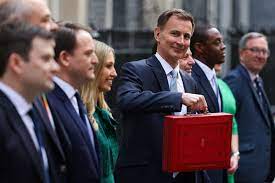UK budget springs few surprises on markets

London: Britain’s economy is forecast to grow by 0.8% this year after entering a recession in the second half of 2023, finance minister Jeremy Hunt said in a budget speech on Wednesday that delivered little in the way of surprises for markets.
In what was possibly his last fiscal statement before an election expected later this year, Hunt offered voters a raft of tax cuts, including to the rate of national insurance, in a bid to woo them back to Prime Minister Rishi Sunak’s Conservatives. This slashed the emergency reserves in the public finances to the bone.
The pound showed little initial reaction, while stocks extended gains. UK bonds or gilts held fairly steady, given the government’s borrowing plans for the coming financial year came in broadly in line with expectations, meaning no repeat of the fireworks that ensued after the interim budget released in September 2022 by then-finance minister Kwasi Kwarteng.
“The net fiscal giveaway of 13.9 billion pounds (0.5% of GDP) in 2024/25 in the budget may, at the margin, help lift the economy out of its mild recession before an election later this year. But a big tightening in fiscal policy is still on the cards for after the election and that will probably require new tax hikes. The resulting drag on the economy may contribute to more interest rates cuts next year than most expect, to 3.00% from 5.25% now.”
“By the time the budget statement was committed to the House, the pound had returned to levels largely in line with those held at the start. News that the OBR is forecasting inflation back at target in a few months did briefly weigh on the pound, given the implications for the BOE. However, aside from the pledge to maintain spending growth at a real 1% going forward (a drop to 0.75% had been mooted), there was little in the way of surprise big-ticket items.”
Lee Hardman, senior currency analyst, mufg, London: “The market reaction has been fairly muted so far. Most of the main measures were already in the media over the weekend, there were no real surprises, and the government has played it relatively safe. From an economic perspective that limits the near term stimulus for the economy, so doesn’t really alter expectations for Bank of England policy.
“At the very margin, you could say it has taken a bigger stimulus off the table, and could mean the Bank of England could cut rates slightly sooner than what’s priced in. But that’s at the margin, the key for determining when the BoE cuts rates is going to be the data on inflation and growth, that’s far more important.”





